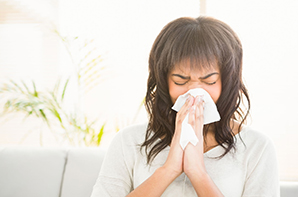The longer days, the warmer weather, the blooming blossoms and, yes, that tell-tale tickle in your nose, streaming eyes and sneezing fits – spring really is in the air.
Hay fever is typically due to pollen allergies, explains Dr Sarah Karabus, an allergologist and paediatrician based in Cape Town. “The plants that produce these pollens include grasses, trees and weeds, which all pollinate at specific times of the year, mainly in spring,” she says. It’s no surprise that hay fever, also known as allergic rhinitis, used to be called ‘spring fever’.
But you don’t have to tolerate unpleasant symptoms. These five steps will help prevent and treat your body’s allergic reaction.
Know your allergens
The first step is to get a proper diagnosis, says Dr Karabus. “Don’t assume anything – adults and children of all ages can be tested,” she says.
Allergies occur when the immune system overreacts to a perceived threat from a harmless substance – the allergen. An allergy test may include a skin-prick test, in which small amounts of possible allergens are pricked into the skin, which is then observed for signs of reaction, or a blood test to measure allergy-causing antibodies in the bloodstream.
The most common springtime allergens are tree and grass pollen and spores from fungi and molds, which can be more prolific in warmer weather. Knowing what triggers your reaction makes it possible to avoid them more effectively.
Preempt the allergy season
“Start your allergy medication a few weeks before the season starts,” advises Dr Karabus. She says this is why step one is so important: “If you know the specific cause of your allergies, you can start your allergy medication prior to the onset of that specific season and thus prevent many of the symptoms.”
Think back on previous years and look for a pattern: when do your allergic reactions usually start? Discuss this history with your GP before you display symptoms so that you can create a treatment plan in advance.
Explore over-the-counter options
“The two main types of allergy medications are oral antihistamines and intranasal corticosteroids,” says Dr Karabus. “Antihistamines help treat the symptoms of itching, sneezing, runny nose and congestion.” Some antihistamines cause drowsiness, so speak to your pharmacist about finding one that does not have this side effect.
Discuss prescription meds with your GP
Over-the-counter medication may not offer everyone relief, so it’s important to discuss prescription options with your doctor. Intranasal corticosteroids, or nasal sprays, for example, are often necessary and very effective in treating the congestion that goes with allergies, but you’ll need a script for these.
“Steroid injections [administered by doctors] do work as well, but have numerous side effects and should rather be avoided,” says Dr Karabus. “The nasal sprays, however, are safe, as very little [corticosteroid] is absorbed into the body, so there are very few serious side effects. They work well when used correctly.”
Learn how to spring-proof yourself
The only way to prevent hay fever it is to avoid the allergens that trigger your spring stuffiness. Try these tips:
- Avoid going outdoors on dry, windy days or early in the morning, when the pollen count is at its highest.
- Close doors and windows to keep pollen out. Vacuum your home frequently and make sure your vacuum cleaner has a good filter.
- Avoid mowing the lawn or raking leaves, both of which can stir up pollen.
- Spread a little petroleum jelly around your nostrils to trap pollen before it can get into your airways and cause irritation.
A vaccine for hay fever?
Immunotherapy is one of the most promising advances in the fight against allergies. Also known as desensitisation, immunotherapy is, as Dr Karabus explains, a vaccine against the specific cause of a patient’s allergy, whereby the reaction of the body’s immune system is changed over time by exposing it to the allergen in increasing doses. It can be given as oral drops under the tongue or be administered as an injection, usually taking around two years of regular treatment to complete the course.
“Immunotherapy is used when symptoms are not well controlled on medication,” says Dr Karabus, “but unfortunately, although it has been used with great success for many years in the USA and Europe, it has not yet been registered in South Africa, which makes it difficult to get hold of. We do use it, with fantastic results, when we can.” She adds that immunotherapy is the only medication that has been proven to cure allergies.
How Clicks can help you beat allergies
Alleviate symptoms with our selection of trusted allergy and hayfever products, and if you need a little extra help, visit your nearest Clicks Pharmacy and speak to a Clicks pharmacist about finding the most effective treatment for your allergies.
IMAGE CREDIT: 123rf.com

